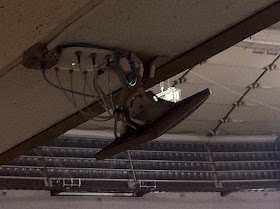
During the first full week of March 2012, we finally learned that B.C. Place Stadium's $40 million Telus naming rights deal was bungled and that grease is leaking from cables onto the roof, causing as much as $10 million of damage.
Both stories offer further proof that the government should get out of the stadium business and focus on what it should be doing: education, healthcare, law and order.
What is harder to prove is that the 800 wi-fi and 100 mobile phone transmitters installed in B.C. Place by Telus and Cisco are hazardous to public health.

The safety of wi-fi networks has been questioned by groups like the Safe School Committee, which opposes wireless Internet in schools and claims it its harmful to children's health. The moms and dads may have a point.
In a monumental move, the World Health Organization's International Agency for Research on Cancer issued this news release on May 31, 2011 calling radiofrequency (RF) electromagnetic fields (EMF) "possibly carcinogenic to humans." Click here to listen to the news conference from that day. The key, universal theme is that more research is needed.
Five months after the stadium reopened from the budgeted $563 million renovation, WorkSafeBC finally took notice. It issued the inspection report below in reaction to concerns expressed by the stadium's Joint Occupational Health and Safety Committee.
In a nutshell, B.C. Place equipment must be "installed, operated and maintained” within Safety Code 6, the Health Canada regulation of human exposure to RF EMF fields from 3 kHz to 300 GHz. That includes radiation notice or warning signs, depending on the intensity of the signal emitted.
Telus spokesman Shawn Hall said the signal strength in B.C. Place is similar to a home wi-fi system or AM/FM radio signals in the airwaves.
“When the committee asked us the question we re-verified our wi-fi and cellular signals in B.C. Place fall within the levels set out by Canada's Safety Code 6, so they are safe,” Hall said. “We are now preparing a detailed response with more detail.”
What does Health Canada say in general about the safety of wi-fi and mobile phone signals?
"Based on scientific evidence, Health Canada has determined that low-level exposure to radiofrequency (RF) energy from Wi-Fi equipment is not dangerous to the public. This conclusion is consistent with the findings of other international bodies and regulators."
"At present, the evidence of a possible link between RF energy exposure and cancer risk is far from conclusive and more research is needed to clarify this "possible" link. Health Canada is in agreement with both the World Health Organization and IARC that additional research in this area is warranted."
For more from Health Canada, click the link here. Or download the PDF here. Industry Canada also has published guidelines for the protection of the general public in this PDF.
I will keep an eye on the minutes of B.C. Place's monthly health and safety committee meetings. If there are any proven cases of radiation-related illness, you'll read about it here.
For now, strained eyes and sprained thumbs from Tweeting on a smart phone at a Whitecaps or Lions game are the most-certain risks from the free Telus wi-fi in B.C. Place.
B.C. Place communications radiation situation
No comments:
Post a Comment